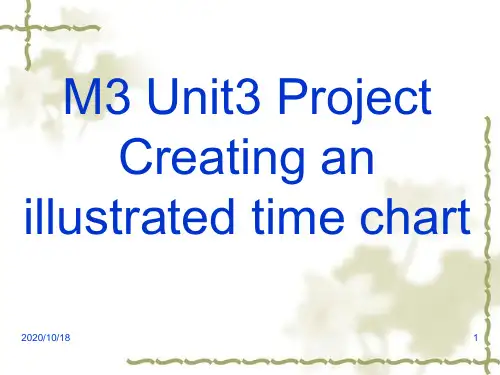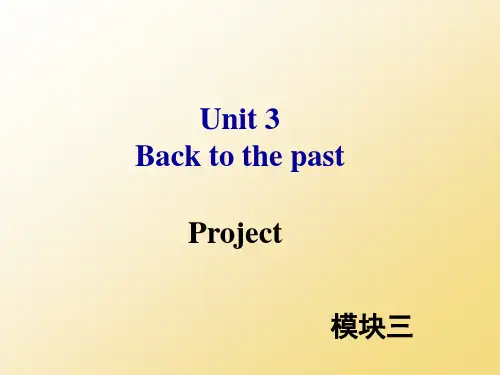模块三第三单元project
- 格式:doc
- 大小:46.50 KB
- 文档页数:4

Unit 3 The world onlineProjectHolding a debate about bringing mobile phones to school ◆内容分析:本板块要求学生围绕“学生是否应该携带手机上学”这一话题展开一场辩论。
首先学生应根据此主题,以小组为单位选择支持正方或是反方观点。
然后各小组根据所选择的观点去做研究,搜集支撑他们观点的论据。
同时,每小组进行组内角色分工,分别为一辩(Lead speaker)、二辩(Second speaker)、三辩(Third speaker)、四辩(Summary speaker),每个角色都要明确自己的任务。
有理有据的辩论离不开语言的支撑,每个辩手都必须熟悉相关句型,以便展开有效辩论。
随后正反方上台,针对话题进行辩论。
在每一场辩论结束后,全班投票评选优胜方。
◆教学目标:By the end of this section, students will be able to:1.explore the advantages and disadvantages of bringing mobile phones to school;2.know the rules of debate and different roles involved in a debate;3.have a debate about whether students should be allowed to bring mobile phones toschool;4.evaluate and comment on each speaker's performance.◆教学重难点:1.Know the rules of debate and different roles involved in a debate;2.Have a debate about whether students should be allowed to bring mobile phonesto school;3.Evaluate and comment on each speaker's performance.◆教学过程:Step 1 Lead-inQ: As a class, discuss the debate topic: should students be allowed to bring mobile phones to school?Step 2 Choose a sideWork in groups. Choose the “for” or “against” side of the debate.Step 3 ResearchAs a group, do some research and think of arguments to support your point of view. AdvantagesMobile phones can be used to●contact their parents or others, especially in emergencies●seek help when in trouble●search for information on the Internet●use some apps to help with academic studies●take online courses which are not offered at school●keep a record of useful information related to studying by photographing or videoand audio recording●publicize some meaningful projects●...DisadvantagesMobile phones may●cause them to check for new messages frequently even during lessons●make them lose concentration on their studies●put them at the risk of being exposed to online violence, inappropriate websitesand false information●encourage them to become mobile phone addicts●reduce face-to-face communication with their peers and teachers, damaging theirrelationships●...Step 4 Choose rolesDecide which role each of you will play.●Lead speakerIntroduce the topic and put forward arguments●Second speakerArgue against the previous opposition speaker and introduce new arguments●Third speakerArgue against previous opposition speakers and build on key arguments●Summary speakerSummarize key arguments and conclude the debateStep 5 ExpressionsIntroducing arguments●My first/second/next argument is ...●There are many examples for this/for ... For instance, ...●In fact, you can find many examples for this in real life. Just think of ...●There are similar cases, such as ...Arguing against previous opposition speaker(s)●But before I come to my own arguments, let's first have a look at what ... has said.●The first opposition speaker has told us ... ; on the contrary ...●He/She also said that ... ; but in fact ...●He/She was claiming that ... ; but as my lead speaker already told you, ...Step 5 ExampleAs a group, choose one group with the opposing point of view. Then two groupsdebate the topic. Use the example below to help you. 教学反思。
![精选高中3Unit3Project[1]公开PPT课件](https://uimg.taocdn.com/6b61e45c83d049649a66584c.webp)


M3U3 Project教案Teaching aims: Help the students to understand the text.Master the meaning and usage of some words and phrases. Teaching procedures:Step1 Lead inDo you know this man ,a man who conquers a lot of land in Yuan Danasty.Yes, he is Genghis KhanHow about this one, a man who contrubute a lot to the mind of chinese.Yes, he is Confucius.Today, let’s going to study another two great people abroad, who also make a great contribution to the development of the land and the mind. One is Alexander the Great, and the other is Socrates.Step2 fast reading and detailed readingIn order to get a brief idea about the stories of this two people, please go through this two passages quickly, and then answer the following questions.Passage 1(fast reading)1 Where was the statue discovered in Xinjiang probably from?2. How old was Alexander when he became king?3.What happened to his kingdom after he died?(detailed reading)1. Which of the following statements is true? CA. The metal statue was send to China by a Greek soldier in ancient times.B. Nothing could stop him from taking control of the entire world including hisown army.C. All people are not in favor of Alexander, when he was 20 years old.D. His son inherit ed(继承)his father‟s kingdom.2. What happened to his kingdom after he died? DA. His kingdom was occupied by another king.B. His kingdom was taken over by his son.C. His kingdom became the largest in the world.D. His kingdom was divided into several parts.Passage 2(fast reading)1 What does the word …philosophy‟ mean?2 Who was Socrates?3 What was his special way of teaching?4 What is the basis of modern philosophy and science?5 What do people think of him?(detailed reading)1. Which of the following statements is true? DA. Socrates earned his living by teaching.B. He wrote many books about his philosophy.C. He was popular among many people in Athens.D. He became famous after his death.2.What was his special way of teaching? CA.He made his students get embarrassed when teaching.B. He made an argument with his students when teaching.C. He raised hard questions when teaching.D. He discussed with his students when teaching.3. Find the same meaning of this sentence"some people had had enough of him"(line20). CA. Some people disliked him.B. Some people decided to kill him.C. Some people couldn't tolerate him any more.D. Some people thought that he did many things which were wrong.Summary of this two passagesStep 3 language pointsPassage 11 influence (n&v)n. 影响,作用;影响力;势力,权势vt. 影响,感化;左右influence sb. (to do sth.)支配(或左右)某人做某事have a good/bad… influence on/upon/over…对……有好的/坏的/……的影响under the influence of受……的影响Some students in my class influence me deeply.Her older sister has a very influence on her.2 doubt n. [U,C] &vt.怀疑I don’t doubt that he’s a brilliant scientist.我不怀疑他是个出色的科学家,但他会教书吗?There is some doubt about the best way to solve the problem.这件事的最佳做法还不太确定。




1.take place=happen2.play a role in在…发挥作用=play a part in3.keyn.钥匙;(打字机等的)键;关键,线索,秘诀;(音乐的)调adj.关键的;主要的a key causea key to …attitude to4.researchn.研究,调查;探索do research onvi.做研究;探究;5.announce宣布;述说;声称;She was planning to announce her engagement to Peter她正计划宣布她和彼得订婚一事announce更接近于汉语“公布”、“告知”的意思,declare含有庄严宣告或交代清楚的意思,declare war against distant:冷漠的,遥远的Distancein the distanceat a distance offrom a distanceappear=show up=turn updisappear appearance:explain----explanation explain to sb. sth.=explain sth. to sb6.doubt:n/v怀疑no doubt 无疑,确实He’s made some great movies and there’s no doubt about it.他拍了一些非常出色的影片。
这一点是毫无疑问的。
There is some doubt about/of /whetherThere is no doubt thatIn doubt 怀疑,不确定Cast doubt on对…产生怀疑Without doubt=beyond doubt=no doubt毋庸置疑7.resultResult in 导致=lead to=cause =bring about=contribute to Result from:由于As a result ofHave an influence on=have an effect on=affectDie ofDie from8.rise up against起义,反抗The slaves rose up against their cruel mastersrise against 起来反抗rise up:起床,耸立,上升,起来造反Gazing at the distant view, we saw mountains rise straight up.9.take…back收回,撤回,归还,(使)返回If that’s the case, you cantake back your words. Take after :将…作为榜样跟随Take apart:拆开Take down:计下,放下Take …for:把…视作Take…in:让…进入,接纳,吸收Take off:脱掉(衣服等),走开,起飞,休假Take up:举起,升起,用尽,耗掉,或者占用Take effect:生效Take root:确定下来,固定下来,(植物)扎根stand in one’s path 阻碍(某人)=stand in one’s waye.g. No one can stand in my path.没有人可以阻碍我。


